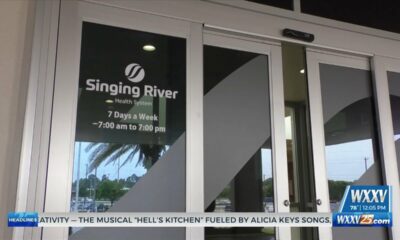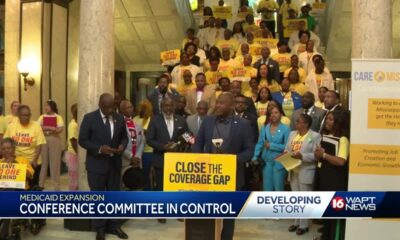Mississippi News
Mental health advocates want input on relief spending
Mental health advocates want input on how federal funds are spent
Advocates want Mississippians who rely on mental health services to have a say in how the embattled Department of Mental Health spends $104.5 million in proposed federal relief funds, and they're hoping the Legislature will make it happen.
On Feb. 11, leaders of four advocacy groups sent a letter to Lt. Gov. Delbert Hosemann and Speaker Philip Gunn asking them to create a “stakeholder committee” to advise DMH on its spending of the American Rescue Plan Act money and monitor the outcomes. Members would include service recipients and their families, care providers, community health centers, law enforcement and others.
“This inclusive and holistic approach would increase the likelihood of better outcomes for people with mental illness and their families,” wrote the leaders of Disability Rights Mississippi, Families As Allies, the Mississippi Coalition for Citizens with Disabilities, and the Mississippi Psychiatric Association.
The federal money would flow to DMH, which employs more people than any other state agency, as it works to expand community-based mental health services.
In 2016, the Justice Department sued the state for violating the Americans with Disabilities Act by forcing people with mental illness to seek care in “segregated state hospitals,” far from their homes and loved ones. In 2019, U.S. District Judge Carlton Reeves ruled that DMH had violated the rights of Mississippians with severe mental illness.
Reeves last year ordered the appointment of an independent monitor to verify DMH's data and evaluate its progress in providing community-based services. But the state is fighting that order with an appeal to the 5th Circuit.
In her presentation to the ARPA subcommittee in December, DMH Director Wendy Bailey proposed using funds to add 60 beds at crisis stabilization units to help divert people from state hospitals, train first responders in mental health first aid, implement the 988 suicide prevention lifeline as it launches in July 2022, and address the agency's staffing shortage.
Joy Hogge leads Families As Allies, a statewide nonprofit that advocates for children with behavioral health challenges and their families. Hogge said the ARPA money could make a big difference for Mississippians seeking mental health services — if it's used thoughtfully. Adding services that can't outlive a temporary funding boost would be a mistake, she said. Tracking outcomes is important, too.
“Ten years from now we could look (and say), ‘Yes, things did get better, more people are getting services, there are more providers, we're growing this,'” she said. “As opposed to just — here's some services that might go away in just a few years and we don't even know if it actually helped.”
Adam Moore, communications director for DMH, said the agency regularly gets feedback from service recipients and other stakeholders through a statewide survey and meetings with advisory councils that include family advocacy groups.
Bailey was copied on the advocates' letter.
“DMH has not directly responded to the letter as it was not addressed to the agency, but we are prepared to share any information regarding our ARPA funds proposal as needed,” he said in a statement to Mississippi Today. “If the agency receives the funds, DMH will also track outcomes related to the services/supports provided through the use of the funds and will report that information publicly.”
Senate Bill 2865 would give broad discretion for the Department to spend about $86 million. An additional $18.5 million is earmarked for the Community Mental Health Centers.
The bill requires the department to consult with at least one outsider as it determines how to spend the money earmarked for community mental health centers: the coordinator of mental health accessibility, Bill Rosamond, a position created by the legislature in 2020.
As Mississippi backs away from institutionalizing people, the state's 13 Community Mental Health Centers are increasingly important: The centers operate mobile crisis response teams and intensive services for people with severe mental illness. The department is shifting funding to expand their work.
Bailey has said she plans to continue following the court's orders despite the state's appeal.
“Most anything and everything we can do to divert from state hospitals and provide services in the community, that is what we are going to do,” she said in September.
In its appeal, the state argues that community-based services are already available and that Reeves had subjected the system to “perpetual federal oversight.”
But Hogge and other advocates say it's too early to say the system is working.
Reeves appointed Dr. Michael Hogan as a “special master,” an official tasked with gathering information to inform a court's decisions.
In his June 2021 report to the court, Hogan, who had tried unsuccessfully to help DMH and the Department of Justice agree on a remedial plan, wrote that Mississippi had made improvements over the last few years, such as reducing the number of people staying in state hospitals for long periods of time.
But he concluded that the full picture of community services isn't yet clear.
“Data on community service performance is not yet adequate to assess performance or to allow the Court to determine if the requirements of the ADA are being met,” he wrote. “Levels of services that are in place have not been verified. The actual availability of services to Mississippians is not yet certain.”
Polly Tribble, the executive director of Disability Rights Mississippi, the organization charged by Congress with advocating for people with disabilities in the state, said she wants to see the ARPA funds help accelerate the growth of community-based services.
“We don't want that money to go into facilities,” she said. “We want it to go into services that are really helping people in the community.”
In addition to the creation of the stakeholder group, the advocates are asking DMH to use the money to strengthen the system's infrastructure, not to provide temporary services. They are also requesting DMH be required to report outcomes to the legislature and the stakeholder group.
The advocates' letter asks that their proposed stakeholder committee work with Rosamond and special master Hogan to help plan the ARPA spending.
SB 2865 is now with the House Appropriations Committee. The advocates hope the letter could lead to changes in the appropriations bill before it is passed.
Hogge said as of Thursday, there have been no substantive conversations about implementing the letter's suggestions.
“I always try to be optimistic that there's possibilities that anything can happen,” she said. “But just based on what I've seen, I'm not really leaning towards that is what's going to happen. I certainly hope it is, and I think that would be the right thing to do.”
This article first appeared on Mississippi Today and is republished here under a Creative Commons license.
Mississippi News
CMSD announces plans to “repurpose” Franklin, Fairview schools
SUMMARY: The Columbus Municipal School District is implementing changes to historic schools, including repurposing Franklin Academy and Fairview Elementary. The specific plans for repurposing are unclear, but it will involve closing the campuses as schools. Elementary grades will be consolidated into three schools, while Hunt School is being rebuilt and will house sixth graders and partner with educational programs. Superintendent Dr. Ellis anticipates completion of construction at Hunt by January and does not foresee staff reductions. The district is also considering partnerships with The W and EMCC for additional educational programs at Hunt.
The post CMSD announces plans to “repurpose” Franklin, Fairview schools appeared first on www.wcbi.com
Mississippi News
Mississippi high court declines to rule on questions of public funds going to private schools
SUMMARY: The Mississippi Supreme Court declined to rule on whether the state was violating its constitution with a $10 million grant program for private schools, as an advocacy group lacked legal standing to sue. The program, funded with federal pandemic relief money, was put on hold after a lawsuit by the ACLU and other organizations. Public schools were excluded from the grants, leading to concerns about competitive advantages. A separate program for interest-free loans for public schools was created. While three justices heard arguments on the issue, the court ultimately decided not to weigh in on the constitutional question.
The post Mississippi high court declines to rule on questions of public funds going to private schools appeared first on www.wjtv.com
Mississippi News
Mississippi Medicaid expansion talks hit a wall
SUMMARY: House Speaker Jason White proposed a ballot initiative for Mississippi voters to voice their opinion on Medicaid expansion, which was not well-received by the Senate. House Democrats are pushing for a work requirement in the expansion but have faced opposition. With the federal government consistently denying Medicaid expansion plans with work requirements, many lawmakers see little point in supporting a measure that is unlikely to be approved. House Minority Leader Robert Johnson III presented a compromise to Senate leadership, but the Senate seems unreceptive. Lawmakers have until Thursday to reach a deal on a conference report or Medicaid expansion will die.
The post Mississippi Medicaid expansion talks hit a wall appeared first on www.wjtv.com
-
Mississippi Today5 days ago
On this day in 1951
-
Mississippi News6 days ago
One injured in Mississippi officer-involved shooting after chase
-
SuperTalk FM3 days ago
Festival merger in Leland sets up one major event for Mississippi Delta
-
Mississippi Business2 days ago
Geartek expanding operations in Alcorn County
-
Mississippi News2 days ago
Two women accused of shoplifting across southeast captured in Mississippi
-
SuperTalk FM4 days ago
PERS bill set to phase in employer rate increase heads to governor’s desk
-
SuperTalk FM6 days ago
Investigation underway after gun found in backpack of Ridgeland High School student
-
SuperTalk FM6 days ago
Mississippi Senate throws curveball, sets spiral in motion for brand new public school funding formula

















































